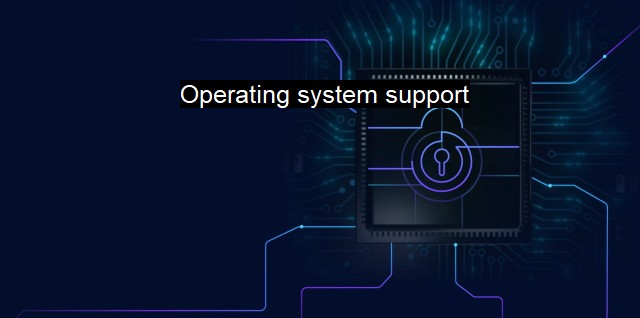What is Operating system support?
The Importance of Operating System Support in Cybersecurity: Safeguarding Businesses from Evolving Malware Threats
operating system support refers to the ability of a security solution to function effectively and efficiently on a particular operating system. Put simply, it is the extent to which a security software vendor invests in the development of their software to protect users on different operating systems.Operating system support is critical in cybersecurity because different operating systems have various security requirements and vulnerabilities. Every operating system is crafted differently and has multiple built-in protocols that give rise to various challenges that security software must confront.
Operating system support must therefore be considered in the selection, implementation, and maintenance of cybersecurity business solutions. In this context, operating system support becomes a major factor when installing cybersecurity software.
Organizations rely on security software vendors to provide reliable security measures, which can protect their systems and networks from cybercriminals. as viruses and malware attacks have multiplied and evolved, the task of developing an operating system security solution becomes more formidable. This is why organizations sometimes have their cybersecurity vendors develop custom security and antivirus solutions either to supplement or replace their off-the-shelf solutions.
Operating system support concept accounts for an array of security resources that software providers can employ to mitigate security vulnerabilities arising from a range of different operating systems. These resources include;
1) Hardening of operating systems;
2) Continuous updating of the cybersecurity solution to adapt to the emerging threats targeting different operating systems;
3) Bugs diagnosis and repair initiatives;
4) Conformity to the recognised security standards of the targeted operating system;
5) Ensuring software compiles with regulations.
There are different types of security solutions available for defending against threats facing multiple operating systems supporting businesses, personal, and enterprise computing solutions. Cybersecurity software providers offer an array of options including endpoint control, web security, intrusion prevention and malware alarms, ensuring that these security measures are effective on several operating systems.
The importance of OS-specific support varies, however, with 97% of computers relying heavily on Windows increasing OS-specific protection prioritization. Portable devices such as mobile phones utilizing different operating systems make wider support key.
To choose the most reliable and efficient security provider, businesses must determine which operating systems they use most and evaluate the extent to which security solutions are culminating in an integrated cross-field environment. Some operating system vendors collaborate digitally with customers to reflect on user feedback, give information, and release plans for future updates.
Antivirus, operating system support and cybersecurity must go hand in hand. Leading antivirus firms strive to ensure that their security solutions integrate with various operating systems and run smoothly while securing the user's system promptly. This requires a rigorous, ongoing development effort.
Cyber-intelligence solutions play critical functions in enhancing operating system security. Security solutions work intelligently with cybersecurity systems to identify attack patterns and analyse those patterns quickly.
OS operating system support is an essential concept in cybersecurity and antivirus systems. The best vendors operating in the industry demonstrate support across multiple operating systems. When selecting a cybersecurity solution, businesses must emphasize selecting solutions based on their targeted operating systems and meet their specific needs in security. Cybersecurity vendors must then prioritise updates, monitoring, and continuously adapt to new requirements and ever-developing threats surrounding different operating systems.

Operating system support FAQs
What is meant by "operating system support" in the context of cybersecurity and antivirus?
Operating system support in the context of cybersecurity and antivirus refers to the compatibility of security software with the operating system of a computer or device. This means that the security software is designed to work seamlessly with the specific operating system version and architecture, providing optimal protection against cyber threats.Why is operating system support important for cybersecurity and antivirus software?
Operating system support is crucial for cybersecurity and antivirus software because it ensures that the security solution can identify and mitigate threats specific to a particular operating system. Without proper support, security software may not function correctly or may miss potentially harmful activities, leaving the system and its data vulnerable to cyber attacks.What are some examples of popular operating systems that require antivirus software support?
Some of the most commonly used operating systems that require antivirus software support include Windows, macOS, Linux, iOS, and Android. Each of these operating systems requires specialized antivirus software tailored to their unique architecture and vulnerabilities.How can I check if my operating system is compatible with a particular cybersecurity or antivirus product?
You can usually check the compatibility of a cybersecurity or antivirus product with your operating system on the product's website. Most security software vendors provide a list of supported operating systems and their versions. Additionally, you can consult the documentation or reach out to customer support for further information.| | A | | | B | | | C | | | D | | | E | | | F | | | G | | | H | | | I | | | J | | | K | | | L | | | M | |
| | N | | | O | | | P | | | Q | | | R | | | S | | | T | | | U | | | V | | | W | | | X | | | Y | | | Z | |
| | 1 | | | 2 | | | 3 | | | 4 | | | 7 | | | 8 | | |||||||